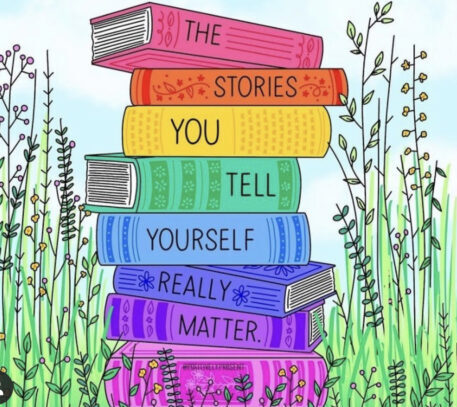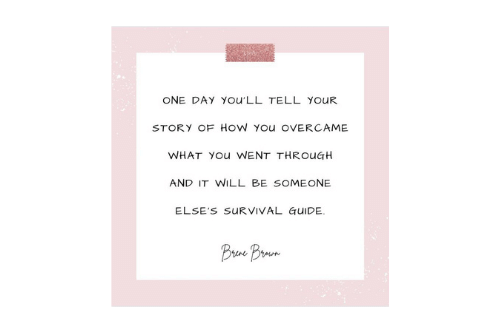Skip to content

Depression fully descended on my mind in 2016. The depths of my despair knew no bounds. For 3 years, reality was completely distorted. It was not until 3 years later; clawing myself out moment by moment, from the personal purgatory of my mind that I felt liberated by the power of owning your own personal narrative. The act of storytelling is an integral part of the healing process.
In early 2019, after years of leaving no stone unturned when it came to treatments for the depression that had ravaged my being; I was placed on a new antidepressant with a new psychiatrist. This precipitated the first positive shift in my mental state in 3 years. I clung to that sliver of light. Hope. And thus began my ongoing journey of personal growth & healing.
To heal, I had to sit in the pain I felt for so many years. To feel all the feels. These powerful memories are interwoven into the fiber of who I am. They are the raw, authentic, vulnerable part of me. This is where my journey of growth began. I have learned to own my truths. I now embrace both my scars & my strengths. Sometimes, the deepest battle wounds are those that we cannot see.
The power of storytelling is inspiring. When I was in my darkest hole, it was others who had weathered the storm, whose voices brought me back to the light. Now that I am on the other side of the darkness; I see how mutually beneficial the power of sharing your truth is.
There is a sense of purpose & meaning when we attach words to the most profound experiences that shape us. There is a mutual benefit in speaking or writing your truth. Your story. It is both a therapeutic process and a service to others. It makes the hardest parts of our realities, real.
How Storytelling Is Good for Your Mental Health highlights how “narrative therapy helps people move past the problematic stories that hold them back in life. By challenging unhealthy beliefs and widening the way they view the stories of their life, they find alternative stories. This leads to new and healthier viewpoints moving forward. In fact, recent research on narrative identity shows that when it comes to life stories, those who find redemptive meanings in their past challenges and adversity, and who tell their life stories with ideas that include agency, exploration or more open-mindedness enjoy higher levels of mental health, well-being, and maturity.”
We are all so much more alike than we realize. We all experience struggle. We will all be tested in our lives. We could all learn a little from one another along the way.
The first time I was allowed to more publicly share my mental health journey was with McLean Hospital as part of their Deconstructing Stigma Campaign. My Deconstructing Stigma Narrative reminds me of the power of authenticity.
The ability to show up as who you ARE| not who you want to be or who you are expected to be.
“You have to advocate. You have to fight for yourself. You have to persevere.”
Laura has been advocating for her mental health care for most of her adult life, and continues to. Towards the end of college, she started seeing “subtle signs” of depression. Later, while building a successful career in the hospitality industry in Chicago, she was unjustly fired from her job. At this point, the “subtle” depression she had been feeling for years took hold of her life.
“I always pour myself into anything I believe in. I give it 1,000% and the results show. Losing that job was the beginning of the end for me. It changed me.”
Getting fired was just one of the stressors adding to Laura’s depression.
“I got fired 5 months after I bought my first home with my long-term boyfriend and our pup. As my depression internally intensified, I broke up with my boyfriend of five years to save him from my own despair. That was the end for me. I thought about what I expected my life to be like, my standards, but more importantly, I am finally realizing what my parents expected of me. But, at 31, I had to learn how to be alone. I had to truly learn how to be me and I failed miserably.”
At this point, Laura knew she had to take charge of her mental health. She reached out for professional help.
“My depression got worse and worse and worse. I was a shell of a human being. I became a mute. I wasn’t me anymore. So, I finally went to my first psychiatrist. I was with her for two years. We tried different medications, different approaches. It was a very difficult process to find what worked right. Prior to finding her, I shopped around for the right fit like I was a serial speed dater. The process is hard, and trying, but you have to persevere and find the right fit for you.”
Unfortunately, after two years of active work and care, Laura was continuing to battle inner turmoil. Her now former psychiatrist recommended a rehab center in AZ. She came back from 28 days in the desert worse than she went.
“I felt like a prisoner. I was stuck in what we called the tank for 72 hours, which is 3x longer than what was expected, witnessed numerous grand mal seizures, people shaking and recovering from intense addictions. Plus, there was bureaucratic nonsense, problems with my insurance. I spent $25,000, and it was awful. I came home more broken than when I went. I also came home with two more mental health conditions to add to my major depressive disorder | ADHD & love addict.”
Back in Chicago, Laura took action. She resigned from her job and came up with a new treatment plan. In time, she started seeing a new psychiatrist & found a therapist for cognitive behavioral therapy which she picked back up when Covid-19 started in March 2020.
“I knew I had to make changes. This is a big piece of everything that’s been happening in my life | realizing when I have to switch gears. I’ve learned that I have to keep fighting, keep advocating.”
Today, Laura continues to advocate for mental health. And she is working to help others with their issues. She is active in her local chapter of the National Alliance on Mental Illness (NAMI), and she lends her communications and planning skills to efforts designed to increase awareness around mental health.
“It’s all about perseverance and fighting for yourself because the system, like every system, has cracks. I look back on the years that I was struggling with my depression. I hold those years of absolute torture close | not in a way that impairs me, but in a way that builds me and makes me more resilient and more perseverant. I realize that I will not stop.”
It is humbling to be comfortable in my own skin enough that I can expose the parts of me that nearly broke me.







